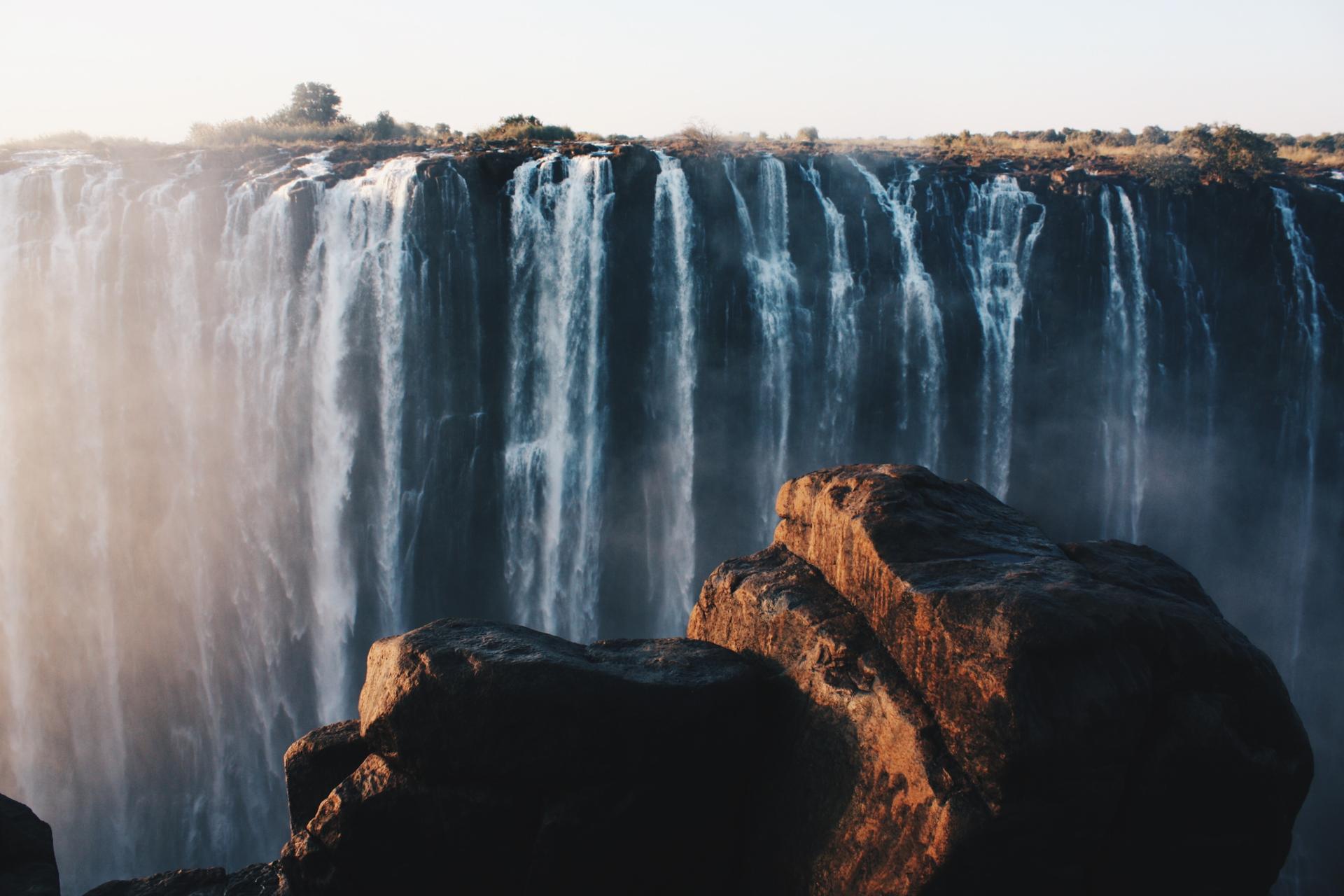Zimbabwe🇿🇼

Zimbabwe is a landlocked country in Southern Africa, bordered by South Africa to the south, Botswana to the west, Zambia to the northwest, and Mozambique to the east and northeast. Relations with these neighboring countries vary, from vital economic connections to political tensions. Zimbabwe is famed for its awe-inspiring natural beauty, with sights such as the Victoria Falls, Hwange National Park, and Great Zimbabwe National Monument being top attractions. Its diverse and beautiful landscapes range from savannahs teeming with wildlife to mountain ranges. The traditional Shona and Ndebele cultures, music, and dance forms are deeply rooted and cherished. Experiencing these authentic traditions, going on wildlife safaris, exploring art galleries, and visiting historic sites are among the recommended activities.
⚠️Things you should avoid⚠️
- Avoid criticizing the government openly. This can lead to legal consequences.
- Avoid drinking tap water. Stick to purified or bottled water.
- Avoid walking alone late at night, especially for women, due to the risk of potential crime.
- Avoid visiting high-risk areas and slums where crime rates are high.
- Do not participate in unsanctioned political gatherings or demonstrations, which can turn violent.
- Avoid traveling at night due to poor road conditions and lack of reliable public transportation.
- Respect cultural norms and traditions. Do not ridicule or trivialize local customs.
- Avoid open displays of wealth which may attract criminals.
- Avoid discussing sensitive topics like homosexuality due to societal prejudices.
- Do not ignore warning signs and safety instructions in wildlife areas to prevent personal injury.
Overall
4
Crime 🔫
4
Zimbabwe experiences a significant level of crime, including violent crime such as armed robbery and home invasion, and property crime, particularly in cities like Harare and Bulawayo. Crimes of opportunity against tourists, including pickpocketing and mugging, also occur. Police service and response times can be diurnal and slow, exacerbating issues.
Terrorism 💣
8
Zimbabwe has a relatively low risk of terrorism, with no significant incidents reported in years. The government maintains strong counter-terrorism measures. However, the threat should not be underestimated due to Zimbabwe's proximity to countries experiencing terror-related activities.
War ⚔️
7
Zimbabwe isn't currently directly engaged in any war. Still, it has a history of internal conflicts, such as the Gukurahundi in the 1980s, wherein an estimated 20,000 Ndebele civilians were killed by the Zimbabwean Army.
Natural Disasters 🌊
7
Zimbabwe is prone to various natural disasters, including droughts, floods, and cyclones. Cyclone Idai in March 2019 caused significant damage in Manicaland, Masvingo, and parts of Mashonaland East. Also, the country is occasionally affected by droughts due to erratic rainfall.
Medical Care 🏥
3
Medical facilities in Zimbabwe are substandard, mainly due to economic constraints and lack of resources. Healthcare centers in rural areas are inadequately staffed and equipped. There’s a shortage of drugs and specialized treatments.
Tap Water Quality 💧
4
Tap water quality varies throughout Zimbabwe, with occasional reports of contamination in specific regions. Whilst tap water in some urban areas may be treated, it's safer to drink bottled or filtered water.
Disease Burden 🤒
3
Diseases such as HIV/AIDS, malaria, cholera, and typhoid are prevalent in Zimbabwe. Especially worrying is the HIV/AIDS situation, which affects a significant portion of the adult population.
Corruption 💸
2
Corruption is a significant issue within Zimbabwe's government, affecting many aspects of life and business. There have been allegations and incidents involving individual politicians and government officials, with very few prosecutions.
Safety for Women ♀️
5
Violence against women, including domestic violence, is a significant problem in Zimbabwe. Support systems and victim protections are inadequate. Women traveling alone are advised to exercise caution at all times.
Safety for Queer People 👬
2
Zimbabwe is not a safe country for queer individuals. Homosexuality is criminalized, and there's societal prejudice against the queer community. Discrimination and harassment incidents are reported.
Censorship 📺
4
Censorship is a concern in Zimbabwe, with the government controlling media and suppressing freedom of speech. Numerous cases of journalist arrests, shutdown of opposition newspapers, and internet blackouts have been reported in the past, especially during times of political unrest.
Public Transportation 🚌
4
Public transportation is often unreliable and crowded in Zimbabwe, leading to safety concerns. It’s advised to avoid nighttime travel due to hazards like unlit roads and inadequate vehicle maintenance.
Other useful information
🔒 How safe is it?
Although Zimbabwe is safe for tourism, precautions are necessary. Crime rates, particularly in urban areas, are relatively high, and medical facilities are lacking. Be careful of water quality, apply mosquito repellants for protection from malaria, and be mindful of cultural norms.
🏰 Embassies in this Country
Numerous foreign embassies are in Harare, the capital of Zimbabwe, including those of the US, UK, Canada, Australia, and many European, Asian, and African nations.
💉 Recommended Vaccinations
Recommended vaccines for Zimbabwe include Hepatitis A, Hepatitis B, Typhoid, Yellow Fever, Rabies, and routine immunizations. Malaria prophylaxis is also recommended.
🐍 Dangerous Animals
Zimbabwe is home to some dangerous wildlife including lions, leopards, crocodiles, elephants, buffalo, and various venomous snakes. Always maintain a safe distance and follow safety instructions when visiting wildlife reserves.
🛂 Visa Requirements
Most nationalities can obtain a visa on arrival for tourism purposes. Ensure to check and follow the latest visa requirements and guidelines.
💲 Currency
Zimbabwe uses its own currency, the Zimbabwean Dollar (ZWL), and US Dollar in some places. Money can be exchanged at banks and authorized foreign exchange dealers.
💳 Credit Card Acceptance
Credit cards are widely accepted in larger hotels, restaurants, and businesses. However, cash is preferred in rural areas, smaller establishments, and for small purchases.
🧑🏭 Is it possible to work and travel in this country?
Work and travel opportunities are limited in Zimbabwe due to current economic conditions. Ensure to have the appropriate visas and permits.
💵 Cost of Travel and Living
The cost of travel and living in Zimbabwe varies widely. While basic expenses can be relatively low, high-end accommodations and activities can be quite expensive.